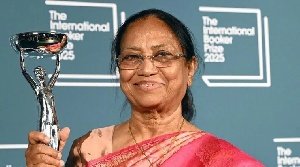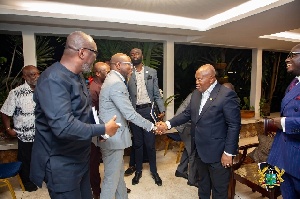- Home - Entertainment
- Lifestyle News
- Year In Review
- Music News
- Entertainers
- Entertainment Archive
- Entertainment Photos
- Jokes
- Entertainment Headlines
- Ameyaw Debrah
- Brown GH
- Celebrities Buzz
- GH Base
- Ghana Celebrities
- Gh Gossip
- GH Page
- GH Splash
- Hot Gossip GH
- YEN
Entertainment of Wednesday, 21 May 2025
Source: www.ghanawebbers.com
India's Banu Mushtaq makes history with International Booker win
Banu Mushtaq Makes History with International Booker Prize Win
Indian writer, lawyer, and activist Banu Mushtaq has made history. She is the first Kannada author to win the International Booker Prize. Her short story anthology, *Heart Lamp*, received this prestigious award. It is also the first short story collection to win the prize.
Judges praised her characters as "astonishing portraits of survival and resilience." *Heart Lamp* features 12 stories written between 1990 and 2023. The stories highlight the struggles of Muslim women in southern India. Deepa Bhasthi translated them from Kannada into English. Bhasthi will share the £50,000 prize with Mushtaq.
In her acceptance speech, Mushtaq thanked readers for their support. She said her book was born from a belief in every story's significance. "In a world that often divides us," she added, "literature remains a sacred space."
Bhasthi hopes this win encourages more translations from Kannada and other South Asian languages. Mushtaq's victory follows Geetanjali Shree's *Tomb of Sand*, which won in 2022.
Mushtaq's work is well-known among book lovers. However, this award has brought greater attention to her life and writing. Her stories reflect challenges faced by women due to religious conservatism and patriarchy.
Mushtaq grew up in a small town in Karnataka’s Muslim neighborhood. Like many girls, she studied the Quran in Urdu at school. Her father wanted more for her; he enrolled her in a convent school at age eight. There, she learned Kannada, the state's official language.
She worked hard to become fluent in Kannada and chose it for her writing. Mushtaq began writing while still in school and pursued college despite societal pressures to marry early.
Her first published story appeared during a challenging time after marriage at age 26. Early marital years were marked by conflict, which she discussed openly in interviews.
In an interview with *Vogue*, she shared how marriage confined her life drastically. "I had always wanted to write but had nothing to write about," she said.
A shocking act of defiance changed everything for her. Once, feeling desperate, she attempted self-harm but was stopped by her husband.
In *Heart Lamp*, Mushtaq’s female characters embody resistance and resilience. A review noted that mainstream literature often flattens Muslim women into stereotypes; Mushtaq refuses this portrayal.
She worked as a reporter for a local tabloid before joining the Bandaya movement for social justice through literature and activism. After ten years in journalism, she became a lawyer to support her family.
Over decades, Mushtaq has published six short story collections, an essay collection, and a novel. However, her honest writing has also made her a target of hate.
In an interview with *The Hindu*, she recounted receiving threats after advocating women's rights in mosques back in 2000. A fatwa was issued against her following these events.
Despite these challenges, Mushtaq continued writing fearlessly about important issues affecting women and marginalized communities today.
Her works have won numerous awards including the Karnataka Sahitya Academy Award and Daana Chintamani Attimabbe Award.
In 2024, an English compilation of five short story collections titled *Haseena and Other Stories* won the PEN Translation Prize.











